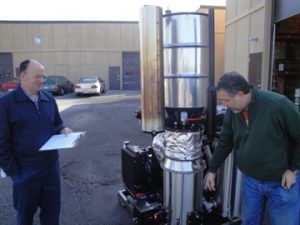Blacksburg, VA. December 10, 2012. The Department of Sustainable Biomaterials (SBIO) at the College of Natural Resources and Environment (CNRE) recently acquired a biomass power plant to support the SBIO Department’s academic and outreach goals. The unit is capable of generating 10 KW (Kilo-Watts) by using biomass feedstocks such as wood chips, nut shells, coconut shells, corn cobs, and manure. The unit is capable of producing 1KWh for every 1.2 kg of biomass.

The unit’s generator is powered by a 3-cylinder combustion engine that uses syngas as fuel. Syngas is produced from carbonaceous materials, such biomass, that reacts with steam or a limited amount of oxygen at temperatures above 750 C to produce mainly nitrogen, carbon monoxide and hydrogen. The gasification process dates back to 1800s where it was used to produce town gas for lighting and cooking. Wood gasifiers were also used to power motor vehicles during World War II fuel shortages. In general the gases produced from the gasification process can be used in other applications such as gas turbines for electrical production, burned for heat generation, or as a source for hydrogen source cells.
The biomass power plant is a great addition to the current and future academic efforts in sustainability at the SBIO Department. There is an increasing interest in the community to learn more about renewable materials and their potential use in energy production and how technology can be integrated in a small-scale system. Also, the SBIO Department’s research efforts will benefit from using the unit to test, characterize, and optimize many of the different type of biomass feedstocks available in the state and beyond. Finally, the undergraduate program at the SBIO Department strives in acquiring and developing systems and technology to support teaching efforts in order to form the best specialists in Sustainable Biomaterials.
If you have questions, or like to see the power plant performing, please contact Dr. Henry Quesada at quesada@vt.edu or 540 231 0978.
